-
What We Do
- WHERE WE WORK
-
About Us
 Welcome Message from Carol Jenkins
Welcome Message from Carol JenkinsFor more than 90 years, World Learning has equipped individuals and institutions to address the world’s most pressing problems. We believe that, working together with our partners, we can change this world for the better.
On my travels, I’ve had the opportunity to meet with many of those who have joined us in this mission. In Baghdad, we’ve trained more than 2,300 Iraqi youth who are already giving back at home. In London, our partners in the TAAP Initiative strongly believe that we are all responsible to practice inclusion. And in Vermont, our Experiment in International Living and School for International Training participants prove every day that they have the tools and the determination to change the world.
Please join us in our pursuit of a more peaceful and just world.
- Get Involved
Media Center > Story
In Iraq, a Reunion Brings Young Changemakers Back Together to Learn From and Inspire One Another
May 22, 2019
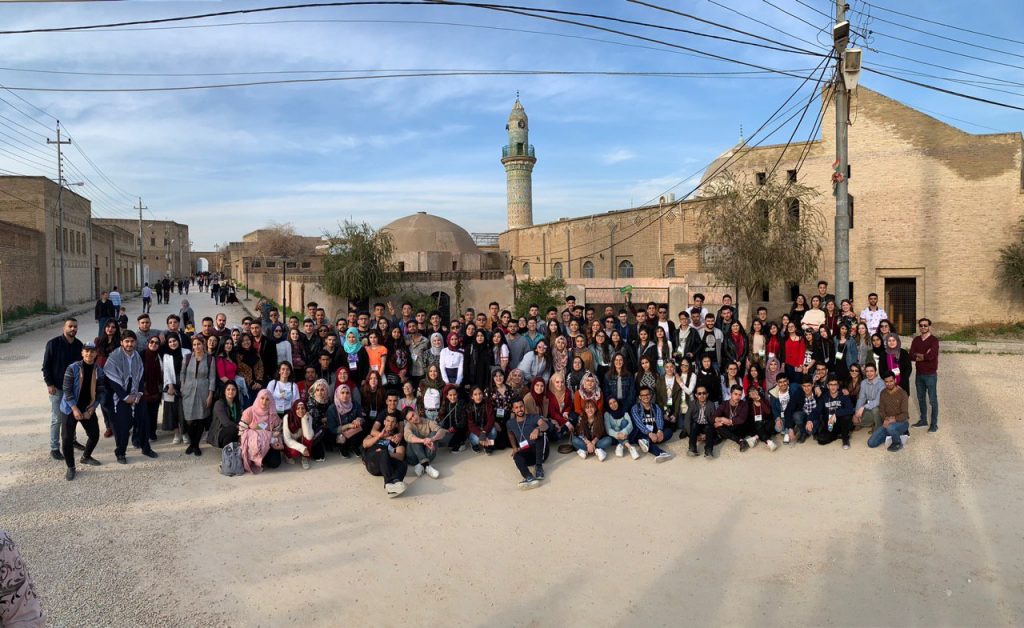
Ask almost anyone who has participated in the Iraqi Young Leaders Exchange Program (IYLEP) and they’ll tell you that their experience traveling to the United States was life-changing. During the exchange, these Iraqi high school and undergraduate students learn how to become better leaders, peacebuilders who drive change in their communities.
But the IYLEP experience doesn’t end when they get home. Not only does the program encourage participants to lead service projects in their communities when they get back — supporting those projects with competitive small grants — but it also gives them another chance to learn from and inspire one another at the IYLEP National Reunion.
Each March, IYLEP brings alumni from the previous summer’s cohorts to Erbil for two-day conferences — one for IYLEP High School students and another for IYLEP Undergraduates. At both reunions, alumni present the projects they carried out in their communities, share their knowledge in an Ideas Market, and build their social and professional networks. Program staff also facilitate workshops on topics ranging from community fundraising to digital advocacy.
How important is the National Reunion to the IYLEP experience? World Learning, which implements the U.S. Department of State-funded program, recently spoke with alumni from last summer’s high school and undergraduate class to find out.
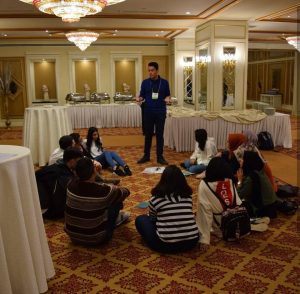
Mohaimen Al Atia
IYLEP High School 2018
Mohaimen Al Atia joined IYLEP for many reasons: he wanted to gain confidence, meet new people, explore different cultures, and learn how to help his community. But he also wanted to prove to kids in his school — some of whom had told him that he would never be accepted to the prestigious program — that he could do it.
He achieved all that and more. Throughout the three-week exchange, Al Atia was able to live with a host family, volunteer with nonprofits in Denver, Colorado; brainstorm project ideas with fellow IYLEPers, and gain a new level of confidence through the program’s many workshops. “They make you feel safe to talk about what you think,” he explains.
Al Atia showed off his newfound confidence as a presenter at the IYLEP National Reunion conference Ideas Market, which was an opportunity for students to lead a discussion with their peers about a topic of their choice. Al Atia chose to discuss how to deal with “haters” and overcome negativity. He told his fellow IYLEPers about the kids at his school who had bullied him, then offered several strategies to both cope and resolve such situations.
It was a success. Al Atia was surprised by how many students turned up to watch his presentation, which he admits made him a bit nervous. But in the end, he decided to continue public speaking in the future. “The whole IYLEP experience was life-changing,” he says. “I can see the difference now when I talk to people. It pushed me out of my comfort zone and made me believe more in myself.”
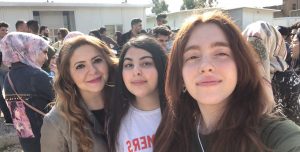
Zainab al-Shaibani
IYLEP Arabic High School 2018
Zainab al-Shaibani was thrilled to make new friends from across Iraq during IYLEP Arabic’s exchange to the U.S. She was looking forward to catching up with them at the high school reunion in March. Little did she know, though, that her network of friends was about to multiply.
IYLEP’s high school reunion brings together all four of the past year’s high school exchange cohorts: three groups in the English-focused program and one group for the Arabic-speakers program. Those groups travel to the U.S. separately, so the reunion is their first opportunity to meet.
It’s also a great chance for them to bond, al-Shaibani says. She worried that the cohorts would have misperceptions about one another. Instead, al-Shaibani says she made close friendships with IYLEP participants across cohorts and from throughout the country. “We broke those stereotypes,” she says. “We are all IYLEP.”
Al-Shaibani also learned about community engagement. She had faced challenges carrying out her IYLEP community project, so she listened with interest to the project presentations and workshops at the National Reunion and how her fellow IYLEPers dealt with challenges they had faced.
The reunion gave al-Shaibani and her new friends the motivation to keep working in their communities. “We all realized that it’s not the end,” she says. “It’s not about only doing one project and just quitting. We also are going to do other projects, too.”
Now that the reunion has ended, al-Shaibani intends to stay in touch with her new friends. Those strong bonds, she says, are one of IYLEP’s most important accomplishments. “What’s interesting about all the IYLEP members is that each one improves the other to be more confident,” she says. “If someone needs help, we all can just ask and all others will help them. So, it’s like a social circle where you feel the most confident and most comfortable.”
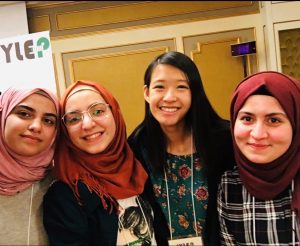
Jannat Almasaoodi
IYLEP Undergrad 2018 and World Learning Regional Program Assistant
Jannat Almasaoodi has been looking forward to the IYLEP reunion since the day she arrived home in Karbala. Not only had she learned about U.S. culture during her exchange, but she had also connected more deeply with her own culture through her new friendships. “It made me realize how much we are diverse but in a way that we can all be together as one,” Almasaoodi says. She couldn’t wait for the next chance to spend time with her IYLEP family.
Despite her early difficulties readjusting to life in Karbala — a common phenomenon known as reverse culture shock — Almasaoodi soon realized that the next phase of IYLEP was ahead of her: engaging with her community. Almasaoodi began visiting a local hospital to provide emotional support to children with cancer as part of a fellow IYLEP alumna’s World Learning grant-funded project. World Learning also hired her as a regional program assistant to help recruit upcoming IYLEP cohorts.
As part of that position, Almasaoodi was tasked with providing logistical support and facilitating a workshop at the IYLEP High School National Reunion. She was impressed by what she saw in the high school students. “I listened to a lot of their projects and ideas and I really loved the way that a lot of them were thinking,” she says. “It is really amazing to see those young people have this much potential.”
After the high school reunion, it was time for Almasaoodi to reunite with her friends from the IYLEP undergraduate cohort as they gathered in Erbil for their own series of workshops and presentations. Almasaoodi felt reassured as she learned about all the work her fellow IYLEPers had been doing in their communities. She discovered that their bonds were as strong as ever. “After the reunion, I realized that we are still together and we are still connected,” she says. “It’s not over yet.”
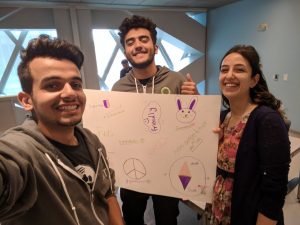
Raniya Sarra
IYLEP Adult Mentor 2018
Raniya Sarra discovered her love for entrepreneurship while serving as an IYLEP adult mentor. At this year’s National Reunion, she deepened her knowledge of the field — and passed it along to Iraqi youth.
A computer engineer and lab instructor at the University of Technology in Baghdad, Sarra applied to IYLEP to improve her leadership skills and better connect with her students. But she found herself inspired by the high school students in her cohort who were so active and positive. “I learned so much from them,” she says.
When she returned home from the U.S. exchange, Sarra began volunteering more in her community. “Before IYLEP, I volunteered once, but I didn’t know what it means,” she says. “From IYLEP, I learned that volunteering is giving back to the community, not just taking.”
Among her service activities, Sarra helped her university host its annual global competition challenging students to find solutions for social problems like youth unemployment. Sarra found herself intrigued by entrepreneurship, which was at the heart of many of the students’ solutions. “I just think entrepreneurship is a great thing to develop the community,” she says. “It has a great impact.”
Wanting to learn more about entrepreneurship — and challenge herself to improve her public speaking skills — Sarra signed up to present at the Ideas Market at the IYLEP National Reunion. In her presentation, she told IYLEP students how entrepreneurship can affect communities and showed them tools for creating their own business plans.
Sarra has an entrepreneurial idea of her own, too, inspired by a visit to Microsoft headquarters in Seattle during the IYLEP exchange. She hopes to someday empower women in Iraq through coding. “The great thing about the IYLEP experience is just learning,” she says. “We enjoy doing activities and we learn by that. I love that a lot.”
The Iraqi Young Leaders Exchange Program is sponsored by the U.S. Embassy Baghdad and the U.S. Department of State with funding provided by the U.S. government and administered by World Learning. It has brought more than 2,500 high school and undergraduate students to U.S. communities to learn about peacebuilding, leadership, and how to engage in their communities.





